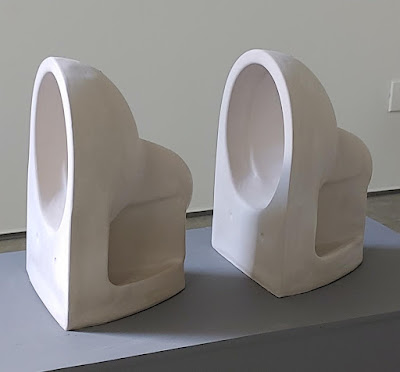by Patricia Frischer
As part of ICA San Diego’s 2024 Interface
season, Superflex: Beyond the End of the World presents a
video and exhibition installation along with a panel discussion. It was unusual
for me to see the panel first and then the exhibition, but that panel colored
my view of the art work on display. It was moderated by Dr. Jordan Karney
Chaim, Curator of ICA San Diego with three participants.
Here is my summary:
Jakob Fenger for Superflex – In
their installation and film at the ICA, Beyond
the End of the World, Superflex use
some humor (clay rolls of toilet paper, urinals as death mask) and metaphor to
describe a future world no longer inhabited by human. One of their big themes is recognizing that
non-human species on earth are just as important as the human species. That
perhaps we need to allow things (including humans) to disappear. No one wants
to change. But our current society finds it is easier to imagine the end of the
world, than the end of capitalism. Fenger knows that Art can’t solve all the
problems. But he appreciates that art allows necessary mistakes, and we learn
from those.
Teddy Cruz, architect and art activist, has been working
within the UCSD university, trying to get out of the neutrality of research and
becoming an advocate. He believes we should not just be gathering information
from communities of need, but constructing partnership and collaboration with
those communities. There is an opportunity to leveraging the economic power of
the university to aid in affordable housing.
Art can’t just be symbolic. It should not just be a reminder of the
problem, but it should transcend the problem. Those communities need to own
their own spaces. Art should be able to
speak to the people and should be able to cut through data-speak.
But If we continue to think taxes are evil, that
politicians can only be bad, that the American dream of urban spawl and growth
on steroid is a right and imminent domain is wrong, then things will never
change. There should not be a war between the public and the private. We need
to embrace the collective well-being. We all want to live in a world that is
safe, with co-existence and empathy and interdependence. He asked, “What is the
political economy that is needed?”
Adam Aron, environmental artist, believes
that climate change is a crisis and it is large institution that are guilty of
abusing it. Elected officials say the right thing, but don’t do anything. The
solution is a large public mobilization to demand changes need to save our
environment. This means civic and volunteer engagement. But how do you mobilize
in the most effective way? He says we need research so we are able to make
change. The change has to happen under capitalism because it is too late to
change that, but our priorities of individual ownership have to change. We need
to share tools, cars, work spaces to cut down on amounts of things. We need artist
to help us imagine a positive version of the future world.
As part of ICA San Diego’s 2024 Interface
season, Beyond the End of the World is on view until June 2 with
a video in the Education Pavilion and until July 28 in the Artists Pavilion
ICA San Diego/ North, (1550 S El Camino Real, Encinitas, CA 92024)
Interface is the collective
title for the 2024-2025 exhibition season and it invites the audiences to
consider how art can expand the relationship between humans and science. The Interface season will consist of six
exhibitions spread over ICA’s two campuses in Balboa Park and Encinitas with free
monthly public C You Saturdays events with artist talks,
exhibition tours, food and music.
The Summer/Fall exhibitions in the north includes solo exhibitions by Rafael LozanoHemmer, Nathalie Miebach, Manuel Alejandro RodríguezDelgado, and Melissa Walter.
In Balboa Park, the ICA Central mezzanine displays Rafael LozanoHemmer’s interactive installation, Remote Pulse (2019) and Nathalie Miebach will occupy the main gallery space.








No comments:
Post a Comment